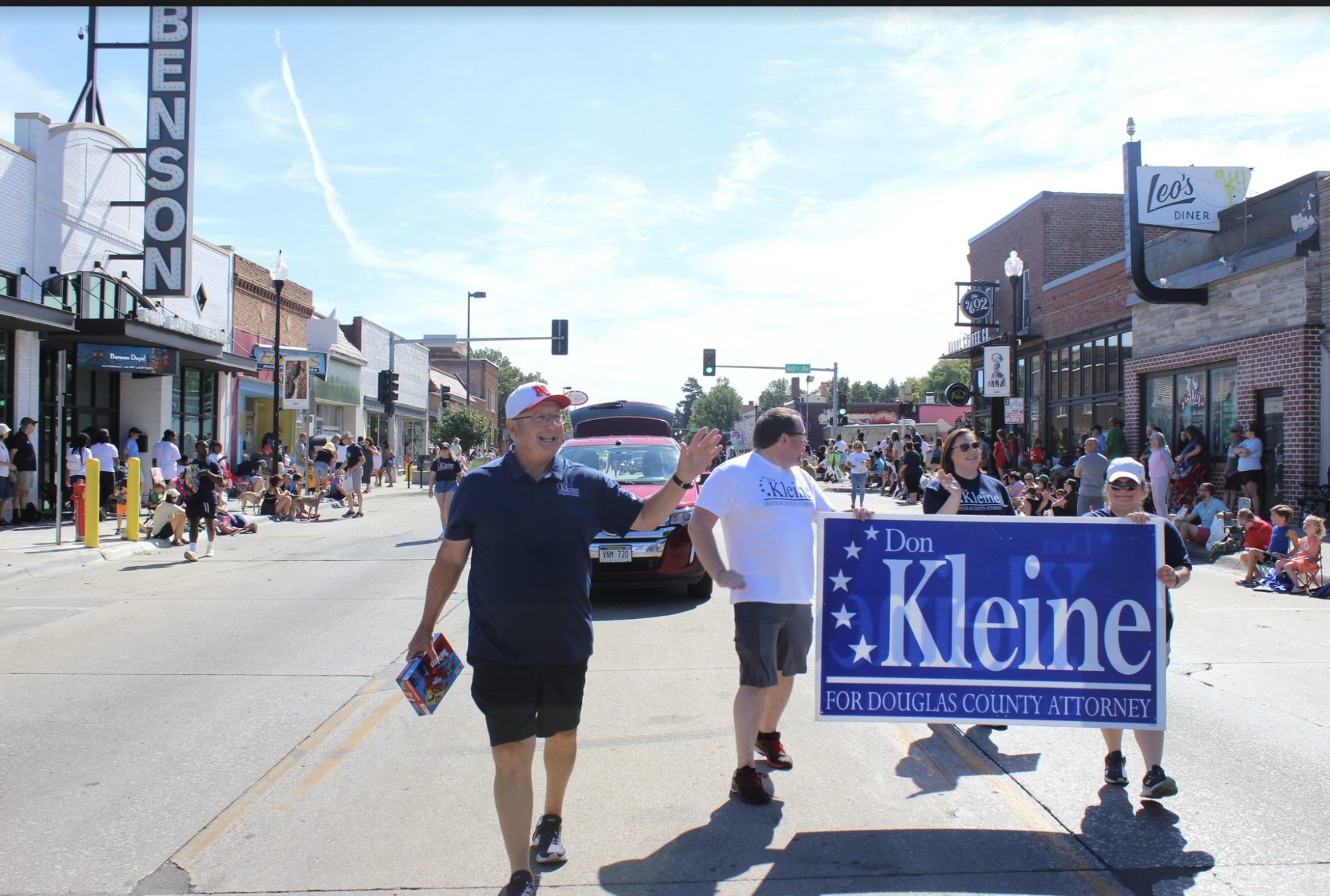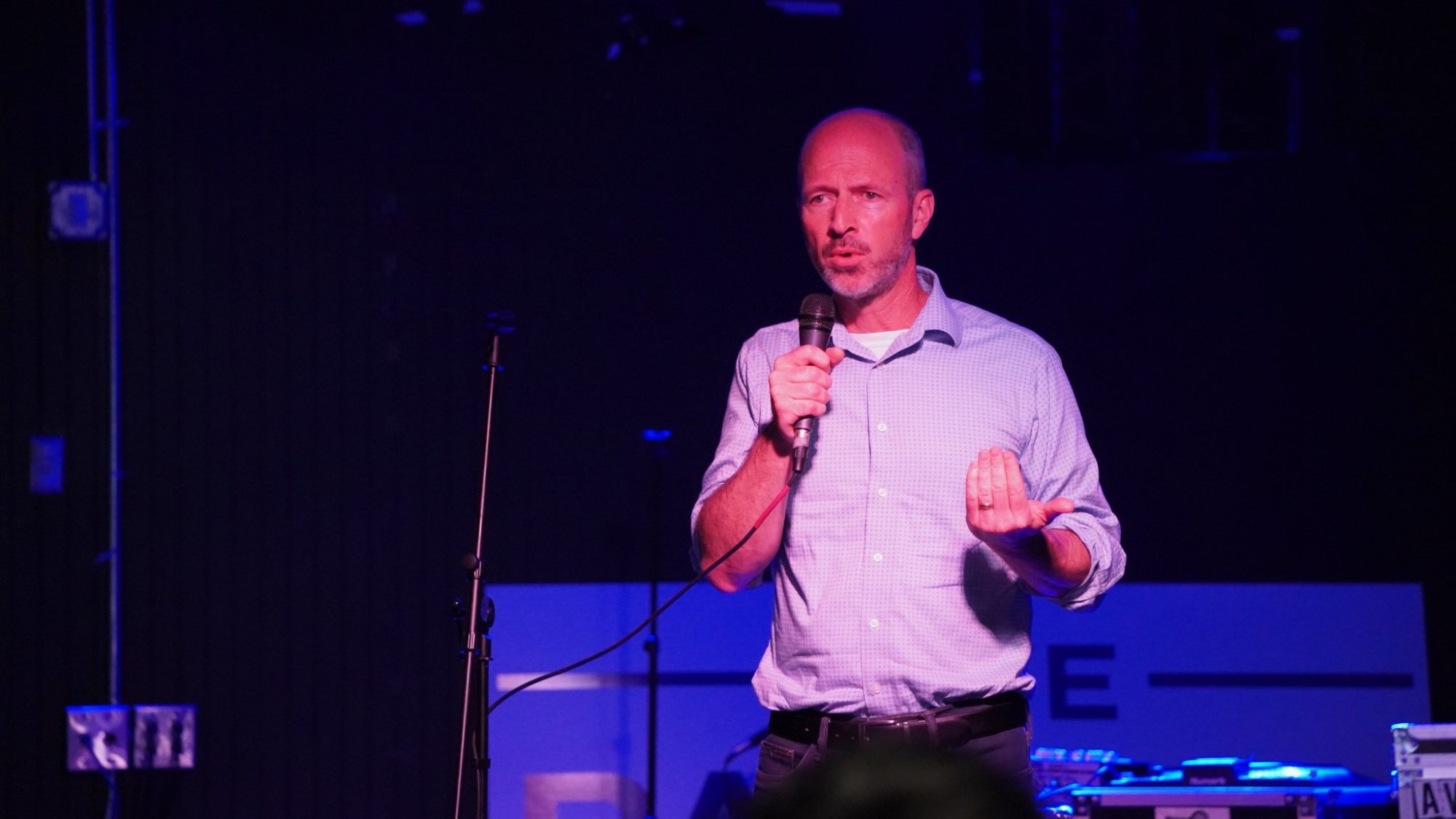Omaha Prosecutor Seeks Re-Election, Two Years After His Party Accused Him of Racism
Don Kleine, a former Democrat now running as a Republican, faces a challenger who proposes reforms on sentencing and drugs, in the context of Nebraska's growing prisons.
| November 7, 2022

Nowhere in the U.S. have prison populations grown in roughly the last decade at a higher rate than in Nebraska. On Tuesday, the top prosecutor in the district most responsible for this ballooning faces voters in a most unusual reelection bid.
The 16-year incumbent in this race, County Attorney Don Kleine, was a Democrat until two years ago. Then, amid the Black Lives Matter citizen uprising of 2020, Kleine garnered statewide controversy after he declined to press charges against white bar owner Jake Gardner, who fatally shot Black protester James Scurlock in downtown Omaha, the county’s population center. Gardner was eventually indicted by a grand jury, before killing himself in Oregon the day before he was set to turn himself in.
For his determination that Gardner had acted in self-defense, Kleine faced the wrath not only of furious activists, but also of his party base: Nebraska Democratic delegates from across the state passed a resolution declaring that Kleine had “perpetuated white supremacy” in his handling of the case. Two weeks later, Kleine switched parties and received a hero’s welcome from the Nebraska GOP.
“You could call Don Kleine a jerk or clown or whatever,” Kleine told The Reader of Omaha. “But white supremacist or racist? Yeah, sorry, I couldn’t handle that.”
He now faces Dave Pantos, a more reform-minded Democratic challenger, and the former executive director of Legal Aid of Nebraska. Pantos told Bolts that he agrees with his party’s resolution slamming Kleine as racist, and that he believes that Gardner should have been charged with manslaughter and several other offenses.
“Clearly there was a sense of, ‘Hey, let’s give this guy a break because he was on our side,'” Pantos said. “He should have been arrested. He should have been charged.”
The contest could be tight. Douglas County voted for Democratic President Joe Biden by 11 percentage points in 2020, but local Republicans have fared better in other races, and the mayor of Omaha is a Republican. Kleine may also benefit from the decisive advantage incumbents usually enjoy in prosecutor elections, though his decision to run with a new party affiliation will test that proposition.
Pantos is running amid controversy of his own. The Omaha World-Herald reported last month that he was fired from Legal Aid of Nebraska in 2014 after the organization’s board of directors investigated an affair he was having with an employee, and a promotion he gave to that employee. Pantos admitted to the affair but told the World-Herald that the employee was already promoted when the affair began; he repeated that explanation to Bolts.
Kleine, who declined to be interviewed by Bolts, didn’t switch parties quietly in 2020, telling reporters he’d voted for former President Donald Trump and that it was an “easy choice.” He held a press conference in 2020 with conservative Nebraska Republican leaders, and vowed at the time that he would not switch his approach to the job of county attorney. He told reporters, “I didn’t change who Don Kleine is. You get what you get here with me, and that’s the way I am. That’s the way I’m going to continue to be. … (I)t’s not going to change how I run the Douglas County Attorney’s Office.”
He was no progressive before his switch, having earned a reputation among local reform advocates as a Democrat resistant to criminal justice reform. Kleine’s office, for instance, has prosecuted four of the five people placed on death row in Nebraska in the years since he was elected, according to the Death Penalty Information Center. (All cases were before his party switch.)
As a Republican, he pushed back against a would-be landmark bill this year that was designed to stem prison overcrowding. Despite being part of the committee that recommended the changes, he did not support the package, and opposed its provision to lower the severity of drug-related charges, among other changes. The bill failed.
Progressive Omaha activist and organizer Morgann Freeman said she’s observed no shift in Kleine’s approach on the policy front. But one change she’s seen in him, she said, is that he seems much more willing to explain himself to the public, even when she’s disagreed with his decision-making.
“That’s the fascinating and traumatizing part: because of what happened with the protests, there was a lot more scrutiny put on his practices that he didn’t have before,” said Freeman, who was standing a block away when Gardner shot Scurlock.
“When he was still listed as a Democrat, he got away with structural racism in a way that I don’t think we’ll ever fully understand.”
The World-Herald’s analysis of U.S. Department of Justice data shows that Nebraska is one of only two states that grew their prison populations between 2010 and 2020, alongside Idaho. While the national average prison population went down by 24 percent during this period, Nebraska’s increased by 16 percent.
Douglas County is overrepresented in Nebraska prisons. In 2020, it comprised a 38-percent plurality of state prison admissions, despite having only 30 percent of the state population, a state commission found. Substantial racial disparities are fueling this dynamic: Research from the University of Nebraska Omaha showed that, as of 2019, one in eight Black residents in Douglas County, which is substantially less white than the state as a whole, had been arrested at some point. That compared to just one in 45 white Douglas County residents.
“I think Omaha is one of the places where you really understand America’s tale of two worlds,” said Ja Keen Fox, the organizer who authored the “white supremacy” resolution against Kleine in September 2020. Fox had recently been removed from a city advisory board by Omaha’s mayor over tweets he wrote in 2016 about a man who killed police officers in Dallas; the mayor’s decision drew a protest from longtime state Senator Ernie Chambers, a Black Democrat who represents Omaha.
“There’s a Black Omaha and there’s a white Omaha,” Fox said. “Don Kleine, to white Omaha, was a stand-up guy.” To Black Omaha, Fox added, “He’s someone that would arrest and prosecute to the maximum, for any kind of crime.” After Pantos entered the race, Fox worked for his campaign but is not currently involved.
Fox pointed in particular to Kleine’s treatment of young Black people accused of crimes; in one well-documented case, he charged a 14-year-old Black boy as an adult in a homicide case. At a hearing this spring, a Democratic state senator who represents Omaha faulted Kleine’s decisions for fueling particularly high incarceration rates among the city’s Black residents.

Pantos is proposing a very different route on criminal justice policy. He criticized the legislature’s failure to contain prison spending and population this legislative session.
He told Bolts that he supports the provision Kleine had taken the most issue with: reclassifying of drug possession cases to make them lower-level misdemeanors rather than felonies.
“If we treat them as misdemeanors, we can still divert them into drug court,” Pantos said, referencing a reason Kleine has given for opposing this change, “and have them come out the other end without having that felony prevent them from getting a job or housing.”
Pantos added that he personally believes many drug possession cases shouldn’t be prosecuted at all but that voters—and systems—may not be ready for such a change.
“It’s recognizing that Nebraska and Douglas County are in the 1980s camp. We need to move from that to the middle first,” he said. “We need to walk before we run … the ultimate goal would be people aren’t being charged at all, but I don’t think the resources are in place yet, and we need to keep the horse in front of the cart.”
Pantos says he would take a similarly incremental approach on other issues to to bringing reform to the prosecutor’s office: He said cash bail amounts to the “criminalization of poverty,” but that he would still seek cash bail in certain cases rather than switching the prosecutor’s office “all at once” in that area.
He said he opposes the death penalty, but that, because Nebraska voters have supported it by repealing a law that had abolished it in a 2016 referendum, he wouldn’t rule out seeking capital punishment if elected. (Douglas County residents also voted in favor of repeal, 52 to 48 percent.)
“I don’t want to put a political scientist hat on too much, but I don’t think the issue of criminal justice reform has been really tested in Nebraska,” Pantos said. “I want to be mindful of the culture and where folks are at. I guess we’ll know more [on Nov. 8] how ready folks are for change.”
Update: This article was updated on Nov. 7 with information about Ja Keen Fox’s previous work on the Dave Pantos campaign.

